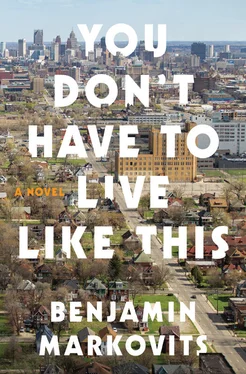“Is that what knocked him out?”
“Objection, Your Honor. Counsel is leading the witness.” It was one of Nolan’s lawyers, the black one, who stood up politely to make his point and sat back down.
The judge said, “Sustained. Let him say it for himself, Mr. Oh.”
So he tried again. “What happened after Nolan’s head hit the floor?”
I looked at Nolan, who was sitting between his lawyers and leaning back in his chair. His arms were folded, which made the shoulders of his suit ruck up against his neck.
“He was out cold,” I said. “I don’t know what knocked him out. Tony kicked him, too. But I think it was probably the floor.”
“And after he passed out, what did you do?”
“Tony called the police, and I told him to send an ambulance, too. I thought, maybe Nolan left the kid with his mother. So I told Tony to look there, but he didn’t know the way.”
“Did you show him the way?”
“I tried to describe it for him, but nobody was in any kind of shape to follow directions. So I went with him.”
“How long did you stay at Mrs. Smith’s house?”
“I don’t know. Five minutes? It could have been two minutes, it could have been ten. I really wasn’t in a normal frame of mind.”
“If Mrs. Smith testified that you stayed at least fifteen minutes, would you have any reason to doubt the accuracy of her testimony?”
“If that’s what she says, I’m sure she’s right. Because at that point for her it was just, you know, an ordinary visit.”
“Can you tell me why you left Nolan unconscious in your apartment for more than a quarter of an hour, while you sat around with his mother drinking lemonade?”
“She’s very welcoming. If she gives you something to drink, you take it. I didn’t want to appear rude. I know this doesn’t make much sense, but I didn’t want her to know what Nolan had done. It would have upset her. Also, we couldn’t get Michael away. Everything takes longer with kids.”
A few minutes later Judge Westinghouse called it a day. What surprised me is this: already I was reluctant to get off my chair. For someone who likes to talk, who cares about the difference between one way of saying something and another, who thinks of speech as the best kind of action. . it was like, for sailors, being in a high wind. People were paying attention, my answers mattered. Whereas that evening, I made myself dinner alone and had nothing to do but go over these answers in my head.
Every morning the steps of the courthouse were packed with reporters and television crews. There were protesters, too, waving placards: Free Nolan Smith , with a picture of Nolan, based on one of his mug shots. Some guy held up a handmade sign that said It Isn’t a Crime on one side and To Live in Detroit on the other. And the next day I had to push my way through these people. All of which reinforced what I felt the day before, that I was an important person, out of all proportion. This time I didn’t have to wait in the waiting room. When the judge called me up to the witness stand, I felt very conscious of the way I walked — about fifteen paces from my seat, around a table and up a few steps. It was like going on stage.
The heating was on, and since it had rained all morning the smell of wet clothes was strong. But you couldn’t hear the rain outside; there were no windows.
Judge Westinghouse took us through the motions. And then Nolan’s lawyer, the black guy, stood up to cross-examine me. He looked fifty, maybe a little older — he had short, well-cut, grizzled hair and rimless glasses, he wore a bow tie, I don’t think he could have been taller than five foot seven. His name was John Barrett; he introduced himself.
“Mr. Marnier,” he said, “I’m going to start by asking you a few general questions. I want you to bear with me for a moment.” He looked at his notes and put them on the table and walked over to me. “How long have you known Robert James?”
“I don’t know, fifteen years, a little more.”
“Can you tell me where you first met?”
“At university,” I said.
“And which university is that?”
Larry Oh stood up. “I don’t see how this is relevant,” he said. “Mr. Marnier is not on trial here. Robert James is not on trial.”
So Barrett wandered over to Judge Westinghouse. He didn’t do anything in a hurry. “Judge,” he said. “I’m going to show that what happened that day happened as a result of a misunderstanding. You had at least two, maybe three, angry people who weren’t listening to each other. Now, there’s a context to that misunderstanding, there’s a history to it, and I plan to show what that history is.”
“All right,” she said. “I’ll let this go for now. But it better go somewhere.”
“Yale,” I said.
“When did you move to Detroit?”
“About two years ago.”
“Had you ever been to Detroit before?”
“No.”
“Do you have any connection to the city, any kind of family history here?”
“No.”
“Can you explain to me why you moved here? Was it for the job opportunities?”
“No, sir.”
“You don’t have to call me sir,” he said. “Mr. Barrett is fine. So why did you come?”
And it went on from there. I found him hard to read. For one thing, his accent shifted sometimes, he changed his voice, too, usually to make a joke. When he asked me again why I moved to Detroit, I told him, “Cheap real estate.” He said, “Come to Gary. We got a lot of empty houses,” and a few people laughed. It doesn’t take much in a courtroom, people are nervous and bored, it’s tension laughter, but still, there was something in the way he said it, like, you and me, buddy, we come from different sides of the tracks. Later I looked up Barrett online (there was a profile of him on legalnews.com), and it’s true, he grew up in Miller Beach, Indiana, and was raised by a single mother. But she was superintendent of the Gary Community School Corporation, and he majored in economics at Notre Dame before going on to Michigan Law. I mean, his background wasn’t that different from mine.
Eventually he said, “Can you describe for this court your first encounter with Nolan Smith?”
So I did my best. I told him some guys were working on my house, and there was a problem with the grid connection, so we had to shut down the street. Anyway, I knocked on people’s doors, I wanted to give them a heads-up. That’s how I met Nolan.
“Did he threaten you on that occasion?”
“Isn’t that a leading question?”
So he smiled at me and said, “I’m cross-examining you, Mr. Marnier. I’m allowed to lead. But I’ll put it this way if you prefer. What was the nature of his response to this information?”
“He wasn’t too happy about it.”
“How did he express this unhappiness?”
“I was with a friend of mine, the guy who was supervising the work. Nolan said that if we went ahead he’d break this guy’s windows with a baseball bat.”
“Did you feel threatened?”
“I don’t know. Nolan talks a big game.”
“Did you go on with the work?”
I thought about this for a minute and said, “Not immediately.”
I couldn’t understand what Barrett was driving at. A lot of what he asked put Nolan in a bad light. But he was also interested in the time Michael told Clarence that he didn’t like “chocolate people”—and Clarence poured milk in his face. It’s amazing the information these people get access to. Maybe Gloria told him. Every little thing becomes a fact.
“What was Tony’s reaction to this incident?”
“Well, he came in right in the middle, when the kids were fighting on the couch. And Clarence is bigger than Michael. Tony wasn’t best pleased.”
Читать дальше












